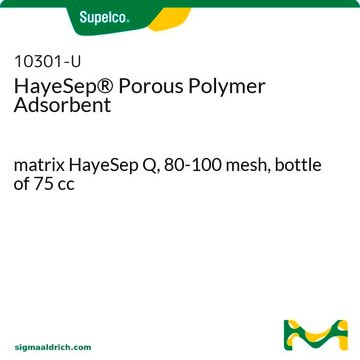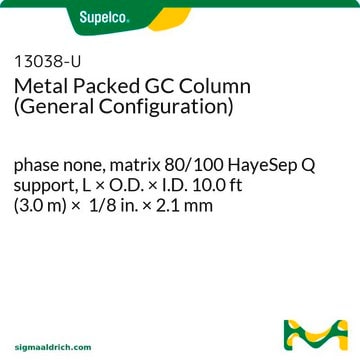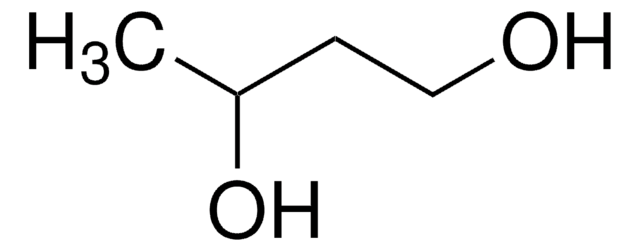10296
HayeSep® Porous Polymer Adsorbent
matrix HayeSep N, 100-120 mesh, bottle of 75 cc
Sign Into View Organizational & Contract Pricing
All Photos(1)
About This Item
UNSPSC Code:
23201100
eCl@ss:
32119290
Recommended Products
form
solid
packaging
bottle of 75 cc
parameter
165 °C temp. limit
technique(s)
gas chromatography (GC): suitable
surface area
~405 m2/g
matrix
HayeSep N
particle size
100-120 mesh
density
~0.36 g/mL (free fall density)
Looking for similar products? Visit Product Comparison Guide
General description
Porous polymers are the most suitable adsorbent for applications based on the analysis of gases, acids, amines, organics of low carbon number and water. They are best suited for gas chromatography and are basically copolymers of polydivinylbenzene (DVB) which are very porous in nature ranging from mesoporous to microporous. HayeSep®has a high surface area owing to its micropores thereby making it a suitable candidate for separation of gases and volatile organic compounds (VOCs). Furthermore they are relatively inert and exhibit hydrophobicity. HayeSep N is a copolymer of poly(divinylbenzene-co-ethylenedimethacrylate).
HayeSep porous polymers, considered second generation materials, are consistent batch-to-batch, with minimal shrinkage and monomer bleed.
For more information about any of our adsorbents, please visit sigma-aldrich.com/adsorbents
For more information about any of our adsorbents, please visit sigma-aldrich.com/adsorbents
Application
HayeSep N was used as a adsorbent for analytical preconcentration of methane which contributes majorly to the greenhouse effect. It was found to have good adsorption capacity, highest overall selectivity and highest enthalpy for methane adsorption as compared to other adsorbents.
Legal Information
HayeSep is a registered trademark of Hayes Separation Inc.
Storage Class Code
11 - Combustible Solids
WGK
WGK 3
Flash Point(F)
Not applicable
Flash Point(C)
Not applicable
Personal Protective Equipment
dust mask type N95 (US), Eyeshields, Gloves
Choose from one of the most recent versions:
Certificates of Analysis (COA)
Lot/Batch Number
Sorry, we don't have COAs for this product available online at this time.
If you need assistance, please contact Customer Support.
Already Own This Product?
Find documentation for the products that you have recently purchased in the Document Library.
Gas Chromatography
Poole C. et al.
Science, 127-130 (2012)
Methane preconcentration by adsorption: a methodology for materials and conditions selection.
Simon E, et al.
Adsorption, 1-10 (2014)
Nanoporous Polymers for Hydrogen Storage and Sulfur as a Thin-Film etch resist.
Germain JB. et al.
Science, 15-16 (2008)
Trace Analysis of Specialty and Electronic Gases.
Geiger W.M and Raynor M.W. et al.
Science, 256-257 (2013)
Gas Chromatography in Air Pollution Analysis.
Berezkin V.G and Drugov Y.S. et al.
J. Chromatogr. Library, 49, 50-51 (1991)
Our team of scientists has experience in all areas of research including Life Science, Material Science, Chemical Synthesis, Chromatography, Analytical and many others.
Contact Technical Service








